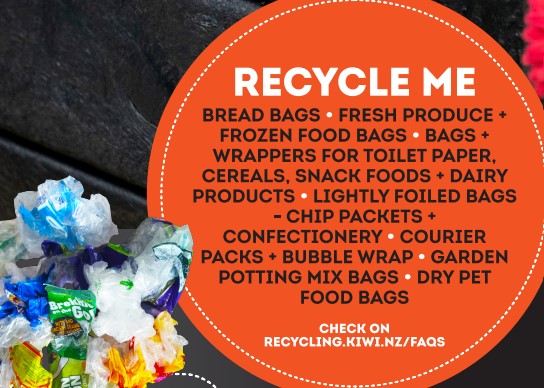Soft Plastic recycling makes a comeback
Soft Plastic recycling has returned to Central Otago and the Queenstown Lakes after a hiatus of five years.
Soft plastic refers to grocery bags, bread bags, bubble wrap, plastic wrappers of products such as biscuits, chips, anything you buy that has a soft plastic sleeve – the type of plastic that is not suitable for the Central Otago District Council kerbside recycling service.
You may have noticed the return of the distinctive bins that belong to the Soft Plastic Recycling Scheme at the various locations that take this type of recycling, which include:
- Alexandra: Countdown, The Warehouse and – coming soon – New World.
- Queenstown: Countdown, New World and The Warehouse - Five Miles Shopping Centre.
- Wānaka: New World Three Parks and The Warehouse.
Central Otago District Council Waste Minimisation Officer Abi Hawkins is encouraged by the scheme’s return.
“This type of plastic packaging is quite hard to avoid on some products and we know residents struggle with this, so it’s great to see the packaging producers within the Packaging Forum partner taking responsibility to collect the packaging they produce. “People want to do the right thing and reduce waste going to the landfill, and it has been a bit frustrating to see more and more packaging marked with a “Return to Store” recycling logo and not have anywhere to drop it off to locally.”
According to Lyn Mayes, Soft Plastic Recycling Scheme Manager, historically, Queenstown, Central Otago and Wānaka residents have championed soft plastic recycling, and prior to collections stopping in 2018, they were dropping off around 1,000kg of soft plastics every month for recycling.
“There is a huge difference between the scheme back in 2018 and how we operate now. Back then we collected, baled, and exported soft plastic overseas. Now all the soft plastic is recycled in Aotearoa New Zealand and it’s 100% funded by our scheme members, including paying our processing partners to take the soft plastics which we collect, which creates more demand for these materials.”
AllWaste will collect and bale the soft plastic, which will be transported to Future Post’s new Blenheim facility for recycling into fence posts destined for farms and wineries, as well as garden frames for households.
“Having the new Future Post operation in Blenheim has helped us expand the service across the South Island– starting with Marlborough in July, Nelson and Tasman in August, and Dunedin and Mosgiel in September. It’s exciting that we now have a brilliant, local South Island solution where the plastic collected is recycled locally,” Ms Mayes said.
In the last 12 months, the soft plastics scheme has collected 657 tonnes of post-consumer soft plastic – the equivalent of 100 million bags or wrappers, and enough to be made into 67,000 Future Posts – or 335km worth of fencing, enough to fence the road from Timaru to Queenstown. Ms Mayes adds that there are now over 285 participating stores with 21% of these in the South Island and the Scheme expects to divert over 1,000 tonnes of soft plastic this financial year from landfill.
Soft plastics cover a variety of packaging bags, packets and wraps, but a good rule of thumb is if you can scrunch it into a ball in your hands – it’s a soft plastic.
Plastic recycling is often reported as the most confusing part of the kerbside service and it is important for residents to note that this scheme is an external service. Soft plastic still can’t be recycled if it is placed in the yellow kerbside bins, Ms Hawkins stresses.
“Soft plastic is the most commonly found contaminant (wrong item) found in our yellow kerbside bins, so it’s important to make sure this ends up in this correct collection service now and not wrongly placed in council bins.”
As with any recycling soft plastic items need to be empty of contents, clean and dry to be recycled.


